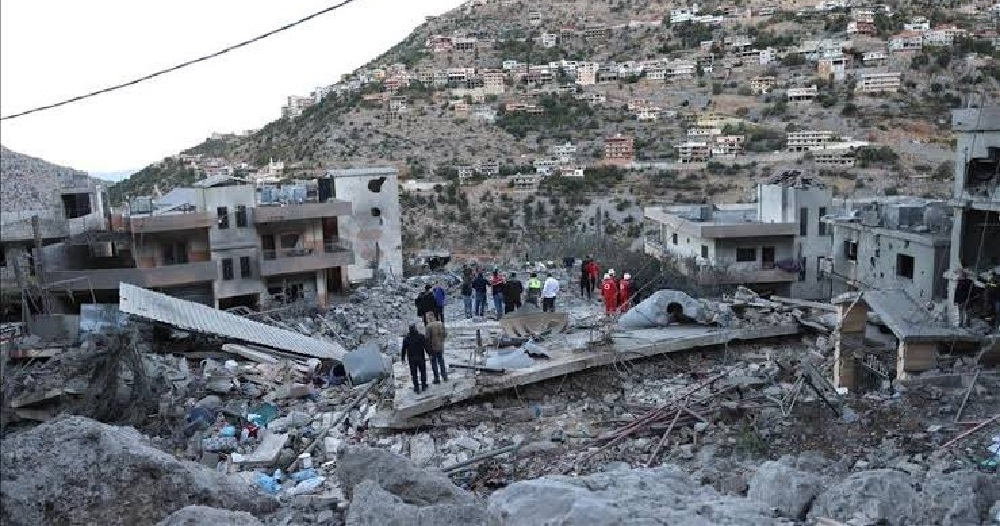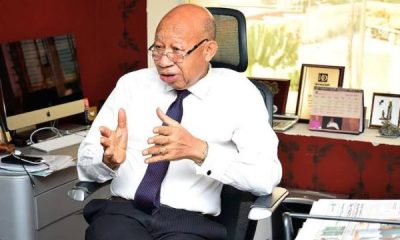Foreign
Israeli airstrikes kill dozens across Lebanon

Israeli airstrikes across Lebanon killed dozens of people on Sunday as the Hezbollah group sustained a string of deadly blows to its command structure, including the killing of its overall leader, Hassan Nasrallah.
Hezbollah confirmed Nabil Kaouk, the deputy head of the group’s Central Council, was killed Saturday, making him the seventh senior Hezbollah leader slain in Israeli strikes in a little over a week. They include founding members who had evaded death or detention for decades.
Hezbollah had earlier confirmed that Ali Karaki, another senior commander, died in Friday’s strike that killed Nasrallah. Israel says at least 20 other Hezbollah militants were killed, including one in charge of Nasrallah’s security detail.
Meanwhile, Israeli warplanes and drones carried out deadly strikes across Lebanon on Sunday. Two consecutive strikes near the southern city of Sidon, about 45 kilometers (28 miles) south of Beirut, killed at least 32 people, the Lebanese health ministry said. Separately, Israeli strikes in the northern province of Baalbek Hermel killed 21 people and injured at least 47.
The Israeli military said it also carried out another targeted strike on Beirut, but did not immediately provide details.
Lebanese media reported dozens of strikes in the central, eastern and western Bekaa and in the south, besides strikes on Beirut. The strikes have targeted buildings where civilians were living and the death toll was expected to rise.
In a video of a strike in Sidon, verified by The Associated Press, a building swayed before collapsing as neighbors filmed. One TV station called on viewers to pray for a family caught under the rubble, posting their pictures, as rescuers failed to reach them. The Lebanese health ministry reported at least 14 medics were killed over two days in the south.
President Joe Biden said Sunday he would speak with Israeli Prime Minister Benjamin Netanyahu, and believes that an all-out war in the Middle East must be avoided.
“It has to be,” Biden told reporters at Dover Air Force Base in Delaware as he boarded Air Force One for Washington.
Meanwhile, wreckage from the strike on Friday that killed Nasrallah was still smoldering. AP journalists saw smoke over the rubble as people flocked to the site, some to check on what was left of their homes and others to pay respects, pray or simply to see the destruction.
In response to the dramatic escalation in Israeli strikes on Lebanon, Hezbollah significantly increased its attacks in the past week, from several dozen to several hundred daily, the Israeli military said. The attacks injured several people and caused damage, but most of the rockets and drones were intercepted by Israel’s air defense systems or fell in open areas.
The army says its strikes have degraded Hezbollah’s capabilities and the number of launches would be much higher if Hezbollah had not been hit.
Israel strikes Houthi targets in Yemen
Also on Sunday, the Israeli military said dozens of its aircraft struck Houthi targets in Yemen in response to a recent attack on Israel. The military said it targeted power plants and sea port facilities in the city of Hodeida.
The Houthis launched a ballistic missile attack on Ben Gurion airport on Saturday when Netanyahu was arriving. The Houthi media office said the Israeli strikes hit the Hodeida and Rass Issa ports, along with two power plants in Hodeida city, a stronghold for the Iranian-backed rebels. The Houthi-run Health Ministry said the strikes killed four people and wounded 40 others.
The Houthis claimed they took precautionary measures ahead of the strikes, emptying oil storages in the ports, according to Nasruddin Ammer, deputy director of the Houthi media office. He said in a post on X platform the strikes won’t stop the rebels’ attacks on shipping routes and on Israel.
Meanwhile, White House national security spokesman John Kirby said Israel’s airstrikes in Lebanon had “wiped out” Hezbollah’s command structure, but he warned the group will work quickly to rebuild it.
Netanyahu on Sunday appointed a former rival, Gideon Saar, to his Cabinet. The move expands Netanyahu’s governing coalition and helps entrench the Israeli leader in office.
Under their agreement, Netanyahu said Saar would be given a spot in the Security Cabinet, the body that oversees management of the ongoing war.
Earlier this month, Hezbollah was also targeted by a sophisticated attack on its pagers and walkie-talkies that was widely blamed on Israel. A wave of Israeli airstrikes across large parts of Lebanon have killed more than 1,030 people – including 156 women and 87 children – in less than two weeks, according to Lebanon’s Health Ministry.
Hundreds of thousands of people have been driven from their homes in Lebanon by the latest strikes. The government estimates around 250,000 are in shelters, with three to four times as many staying with friends or relatives, or camping out on the streets. Hezbollah, a Lebanese group and political party backed by Iran, Israel’s chief regional rival, rose to regional prominence after fighting a devastating monthlong war with Israel in 2006 that ended in a draw.
Hezbollah began firing rockets, missiles and drones into northern Israel after Hamas’ Oct. 7 attack out of Gaza triggered the war there. Hezbollah and Hamas are allies that consider themselves part of an Iran-backed “Axis of Resistance” against Israel.
The conflict has steadily ratcheted up to the brink of all-out war, raising fears of a region-wide conflagration.
Israel says it is determined to return some 60,000 of its citizens to communities in the north that were evacuated nearly a year ago. Hezbollah has said it will only halt its rocket fire if there is a cease-fire in Gaza, which has proven elusive despite months of indirect negotiations between Israel and Hamas led by the United States, Qatar and Egypt.
(The Associated Press)
Foreign
EU says it prefers negotiations, but proposes first tariffs on US imports

The European Commission said on Monday it had offered a “zero-for-zero” tariff deal to avert a trade war with U.S. President Donald Trump as EU ministers agreed to prioritise negotiations, while striking back with 25% tariffs on some U.S. imports.
The 27-nation bloc faces 25% import tariffs on steel and aluminium and cars and broader tariffs of 20% from Wednesday for almost all other goods under Trump’s policy to hit countries he says impose high barriers to U.S. imports.
On Monday evening, the Commission proposed its first retaliatory tariffs at 25% on a range of U.S. imports in response to Trump’s steel and aluminium tariffs rather than the broader levies.
However, the list was shortened after the EU executive bowed to pressure from member states and removed bourbon, wine and dairy after Trump threatened a 200% counter-tariff on EU alcoholic drinks. France and Italy, major exporters of wine and spirits, were particularly concerned.
EU trade chief Maros Sefcovic said earlier on Monday the retaliation would impact less than the previously announced 26 billion euros ($28.4 billion). The tariffs for most of the goods will go into effect May 16 and some from December 1.
Ministers overseeing trade met in Luxembourg on Monday to debate the EU’s response and discuss relations with China. Many said the priority was to launch negotiations to remove Trump’s tariffs, rather than fight them.
Michal Baranowski, deputy economy minister of Poland, told a press conference after the meeting that his EU counterparts did not want to be “trigger-happy”.
Sefcovic said discussions with Washington were at an early stage and that he had offered “zero-for-zero” tariffs for cars and other industrial products, expressing hope that discussions could begin.
However, Trump’s top trade adviser on Monday dismissed tech-billionaire Elon Musk’s push for “zero tariffs” between the U.S. and Europe, calling the Tesla CEO a “car assembler” reliant on parts from other countries.
“While the EU remains open to – and strongly prefers – negotiation, we will not wait endlessly,” Sefcovic said, adding the bloc would push ahead with countermeasures and steps to avoid floods of diverted imports.
The EU is set to approve the first retaliatory measures this week. The bloc will start collecting the tariffs on April 15, with a second tranche starting a month later.
The removal of bourbon from the list of items subject to the EU’s retaliatory tariffs on U.S. imports “would be great news, and we are hopeful this is the case,” said Chris Swonger, chief executive of the Distilled Spirits Council of the United States. “It would be the first step toward getting the U.S.-EU spirits sectors back to zero-for-zero tariffs and untangling distilled spirits products from these wider trade disputes.”
EU KEEPS ALL RETALIATION OPTIONS OPEN
The bloc is expected to produce a larger package of countermeasures by the end of April, as a response to U.S. car and broader tariffs.
Sefcovic said the EU was ready to consider all retaliatory options. One is the EU’s Anti-Coercion Instrument, which allows it to target U.S. services or to limit U.S. companies’ access to EU public procurement tenders.
“We are prepared to use every tool to protect (the) single market,” he said, echoing the views of French Trade Minister Laurent Saint-Martin.
In a war of tariffs on goods, Brussels has less to target than Washington, given EU goods imports from the U.S. totalled 334 billion euros ($366.2 billion) in 2024, against 532 billion euros of EU exports to the U.S.
Some EU countries, particularly those exposed to trade with the United States, urged caution. Irish Foreign Minister Simon Harris described the Anti-Coercion Instrument as “very much the nuclear option.”
Baranowski of Poland said EU members were willing to keep options open, with a stress on proportionality.
“There were various ideas put on the table. Some countries mentioned services. Others didn’t. Some countries mentioned digital services, others didn’t,” he said.
Outgoing German Economy Minister Robert Habeck said the EU should realise it was in a strong position – if it was united.
“The stock markets are already collapsing and the damage could become even greater … America is in a position of weakness,” he said in Luxembourg.
Foreign
British MPs return to London after Israel deportation

Two Labour MPs say they are “astounded” to have been denied entry to Israel while on a trip to visit the occupied West Bank.
Abtisam Mohamed and Yuan Yang said it was “vital” parliamentarians were able to witness the situation in the occupied Palestinian territory first-hand.
They were refused entry because they intended to “spread hate speech” against Israel, the nation’s population and immigration authority said.
Foreign Secretary David Lammy criticised Israeli authorities, describing the move as “unacceptable, counterproductive, and deeply concerning”.
But Conservative leader Kemi Badenoch said Israel had a right to “control its borders”, adding it was “significant” there were Labour MPs other countries did not want to let in.
Yang, the MP for Earley and Woodley, and Mohamed, the MP for Sheffield Central, flew to Israel from London Luton Airport with two aides on Saturday afternoon.
The Israeli immigration authority said Interior Minister Moshe Arbel denied entry to all four passengers after they were questioned. It accused them of travelling to “document the security forces”.
The Israeli embassy in London said in a statement on Saturday that the country “will not allow the entry of individuals or entities that act against the state and its citizens”.
It said Mohamed and Yang had “accused Israel of false claims” and were “actively involved in promoting sanctions against Israeli ministers”.
It also said they had supported campaigns aimed at boycotting the country “at a time when Israel is at war and under attack on seven fronts”.
The UK Foreign Office said the group was part of a parliamentary delegation. However, Israel’s immigration authority said the delegation had not been acknowledged by an Israeli official.
The Israeli embassy said the MPs “were offered hotel accommodation, which they declined” and the cost of their return flight to the UK was covered.
Israel’s Interior Ministry said the MPs left the country early on Sunday.
Mohamed and Yang said their trip had been organised with UK charities that had “over a decade of experience in taking parliamentary delegations”.
“We are two, out of scores of MPs, who have spoken out in Parliament in recent months on the Israel-Palestine conflict and the importance of complying with international humanitarian law,” the MPs said in a joint statement.
“Parliamentarians should feel free to speak truthful in the House of Commons, without fear of being targeted.”
Lammy said the Foreign Office had been in touch with both MPs to offer support, adding: “I have made clear to my counterparts in the Israeli government that this is no way to treat British parliamentarians.”
The Council for Arab-British Understanding and Medical Aid for Palestinians – the latter of which is a registered UK charity – said in a joint statement that they had organised the trip.
“This visit was part of that long-standing programme,” they said.
“When questioned, the group was clear, open and transparent about the aims and objectives of the visit, which included visiting a range of projects run by humanitarian and development organisations operating in the West Bank.
“The group had informed the UK consul general in Jerusalem of their visit and was planning to meet with them as part of the itinerary.”
Both Yang and Mohamed – who were first elected in 2024 – have made several interventions on the Israel-Hamas conflict in Parliament.
In February, Mohamed initiated a cross-party letter, signed by 61 MPs and lords, calling for a ban on goods from Israeli settlements on Palestinian territory, citing an opinion from the International Court of Justice (ICJ).
She has also criticised Israel for withholding humanitarian aid from Gaza, telling the House of Commons in October that international law “prohibits the starvation of civilians as a method of warfare”, and has mentioned humanitarian organisations’ claims of “ethnic cleansing” in Gaza.
In January, Yang spoke in favour of bringing sanctions against Israeli ministers Itamar Ben-Gvir and Bezalel Smotrich, after they suggested building Israeli settlements in northern Gaza to encourage Palestinians to leave.
She has also highlighted the dangerous conditions journalists and medical professionals face while in the Palestinian territory.
When asked about Israel’s decision, Conservative leader Kemi Badenoch told the BBC’s Sunday with Laura Kuenssberg that countries “should be able to control their borders”.
“What I think is shocking is that we have MPs in Labour [who] other countries won’t allow through,” Badenoch said. “I think that’s very significant.”
Her comments were rebuffed by Emily Thornberry, the Labour chair of the foreign affairs select committee, who described Yang and Mohamed as “highly respected parliamentarians” and “potential leaders”.
“Israel is badly advised to try and alienate them, to humiliate them and to treat them in this way,” she told the programme.
“I think that it’s an insult to Britain and I think it’s an insult to Parliament.”
Sir Ed Davey accused Badenoch of “yet another complete shocker”.
The Liberal Democrat leader said she “has once again shown unbelievably poor judgement by failing to back two British MPs denied entry to Israel”.
Lammy called Badenoch’s comments “disgraceful”, asking her: “Do you say the same about Tory MPs banned from China?”
During the war in Gaza, there have been protests, violent incidents and raids by Israeli forces in the West Bank. Hundreds of deaths have been reported there.
Israeli troops have been engaged in an extended operation in the occupied Palestinian territory, where two Palestinians were killed on Friday.
The current war began on 7 October 2023, when Hamas fighters launched a surprise attack on Israel, killing around 1,200 people and taking 251 hostages back to Gaza.
Since then, Gaza’s Hamas-run health ministry says more than 50,000 people have been killed. It said 1,309 people have died since a ceasefire ended on 18 March.
Lammy said: “The UK government’s focus remains securing a return to the ceasefire and negotiations to stop the bloodshed, free the hostages and end the conflict in Gaza.”
Foreign
US cancels visas for South Sudanese over deportation dispute

US Secretary of State Marco Rubio has announced that the US is immediately revoking visas issued to all South Sudanese passport holders due to the African nation refusing to accept its citizens who have been removed from the US.
Rubio, in a statement on Saturday, added that the US will also block any arriving citizens of South Sudan, the world’s newest country, at US ports of entry.
He blamed “the failure of South Sudan’s transitional government to accept the return of its repatriated citizens in a timely manner”.
A cornerstone of President Donald Trump’s immigration policy is removing unlawful migrants from the US, with the promise of “mass deportations”.
“It is time for the Transitional Government of South Sudan to stop taking advantage of the United States,” said Rubio.
“Every country must accept the return of its citizens in a timely manner when another country, including the United States, seeks to remove them,” he added.
It comes as fears grow that South Sudan may again descend into civil war.
On 8 March, the US ordered all its non-emergency staff in South Sudan to leave as regional fighting broke out, threatening a fragile peace deal agreed in 2018.
South Sudanese in the US were previously granted Temporary Protected Status (TPS), which allows them to remain in the US for a set period of time.
TPS for South Sudanese in the US had been due to expire by 3 May.
South Sudan, the world’s newest nation, gained independence in 2011 after seceding from Sudan.
But just two years later, following a rift between President Salva Kiir and Vice-President Riek Machar, the tensions erupted into a civil war, in which more than 400,000 people were killed.
A 2018 power-sharing agreement between the two stopped the fighting, but key elements of the deal have not been implemented – including a new constitution, an election and the reunification of armed groups into a single army.
Sporadic violence between ethnic and local groups has continued in parts of the country.
Since returning to office, the Trump administration has clashed with international governments over deportations of their nationals from the US.
In January, Colombian President Gustavo Petro barred two US military flights carrying deported migrants from landing in his South American country.
Petro relented after Trump promised to place crippling tariffs and sanctions on Colombia.
One of the most famous South Sudanese citizens currently in the US is Duke University star basketball player 18-year-old Khaman Maluach.
A spokesman for the university said on Sunday the school is “aware of the announcement… regarding visa holders from South Sudan”.
“We are looking into the situation and working expeditiously to understand any implications for Duke students.”
Maluach, who played for the South Sudanese Olympic basketball team last summer, spent much of his life in Uganda after fleeing his violence in his homeland as a child.
The first-year student – whose Duke team was eliminated from the national championship tournament Saturday night after losing in the semi-finals to the University of Houston – is widely expected to join the ranks of the NBA after graduation.
-

 News8 hours ago
News8 hours agoJust in: Founder of Diamond Bank and ex-chairman of MTN, Paschal Dozie is dead
-

 News14 hours ago
News14 hours agoRainfall washes away newly constructed multi-million naira road in Edo State
-

 News14 hours ago
News14 hours agoEvangelist Kekere Jesu buried amidst deep sorrow
-

 Metro15 hours ago
Metro15 hours agoStray bullet from VIP convoy kills bystander in Abuja
-

 Sports8 hours ago
Sports8 hours agoReal Madrid keeping tabs on Victor Osimhen
-

 News9 hours ago
News9 hours agoNaira Nosedives Against Dollar
-

 News14 hours ago
News14 hours agoLG autonomy: Govs block council chairmen from opening CBN accounts
-

 News9 hours ago
News9 hours ago2Baba’s Lover Natasha Osawaru Fired As Edo Assembly Minority Leader






